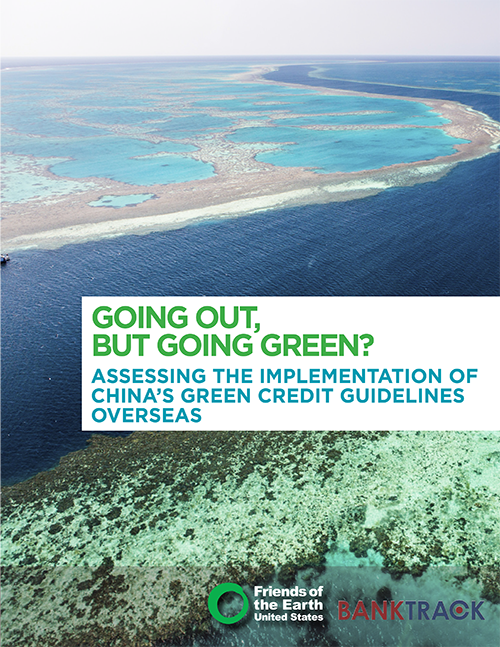- Blog
- Climate & Energy Justice
- Going out, but going green?
Going out, but going green?

Donate Now!
Your contribution will benefit Friends of the Earth.
Stay Informed
Thanks for your interest in Friends of the Earth. You can find information about us and get in touch the following ways:
Chinese banks are the largest lenders to development projects in the world. As Chinese banks increasingly invest in development projects overseas, will they also invest in environmental and social sustainability? Our new report, “Going out, But Going Green? Assessing the Implementation of China’s Green Credit Guidelines Overseas”, examines the extent of bank compliance with China’s landmark, green finance policy.
In the past decade, Chinese overseas investment has soared — since 2002, experts estimate that Chinese banks have lent a total average of about USD $140 billion overseas. However, as Chinese banks invest internationally, they have yet to embrace international environmental and social safeguards.
Our latest report, Going out, But Going Green? Assessing the Implementation of China’s Green Credit Guidelines Overseas, is the first report examining whether Chinese banks have complied with the international provision of China’s Green Credit Guidelines. Article 21 of the Guidelines requires banks to ensure that borrowers follow host country law and international best practices when operating abroad. Despite this strong signal from Chinese regulators for banks to foster sustainability and environmental protection, the report found that Chinese banks are failing to uphold Article 21.
In examining seven case studies of overseas Chinese bank lending, we found several instances where Chinese-financed projects are potentially jeopardizing the livelihoods and well-being of local and indigenous communities. For instance, Liberian communities have lodged complaints against a Chinese financed palm oil plantation; and in Ecuador, indigenous communities have launched a movement to stop a Chinese owned copper mine in one of the most biodiverse regions in the world. In another example, Chinese financed coal export terminals are threatening the health of the Great Barrier Reef.
In exploring why Chinese banks may not be fully implementing the GCG, the report finds that banks lack experience and expertise in local law, culture and community engagement, and do not have processes for concretely operationalizing green credit principles into their entire lending process.
In one case study, China Development Bank financed a coal plant in Bosnia-Herzegovina which violated local law, in addition to European Union regulations. This lack of familiarity with local and regional rules led CDB to finance a deal which has led to a legal complaint. In another example, ICBC financed the highly controversial Lower Sesan Dam II in Cambodia. Although ICBC did not appear to lend directly to the project, its involvement via leasing agreement raises questions regarding how banks should apply GCG to complex financial arrangements.
The report also offers recommendations to Chinese banks, local Chinese embassies, and Chinese bank regulators. A common thread throughout the case studies was the lack of public accessibility to Chinese banks. In many cases, local NGOs attempted to notify banks of their concerns, however, it was often unclear if the bank received NGO letters, or what was the best method of contact. In one case, local Ecuadorean groups attempted to fax and email their letter to banks unsuccessfully, and even mailed packages to Chinese banks were returned.
As evidenced through these cases, an important first step in ensuring banks comply with the GCG is to ensure a reliable, open means of communication with the public; one of our key recommendations for Chinese bank regulators and banks is to establish a specific unit or contact person to be responsible for receiving and addressing requests for information from the public.
Chinese banks have now surpassed traditional financiers such as the World Bank and U.S. Export Import Bank in terms of international lending, and as they invest internationally, they ought to abide by international best practices and norms. Our new report represents the continuation of Friends of the Earth U.S.’s work to promote sustainable finance among international banks, and supplements our past research on the China Development Bank, Chinese state owned enterprises, Chinese green finance and environmental standards among international banks.
Our focus on the GCG represents our deep interest on emerging, new models of sustainability in the banking sector. Although China has a troubled environmental history, it has also set an impressive record in pioneering green finance models like the GCG. If China is to successfully tackle environmental problems at home while preventing them abroad, Chinese banks will need to play a stronger role.
